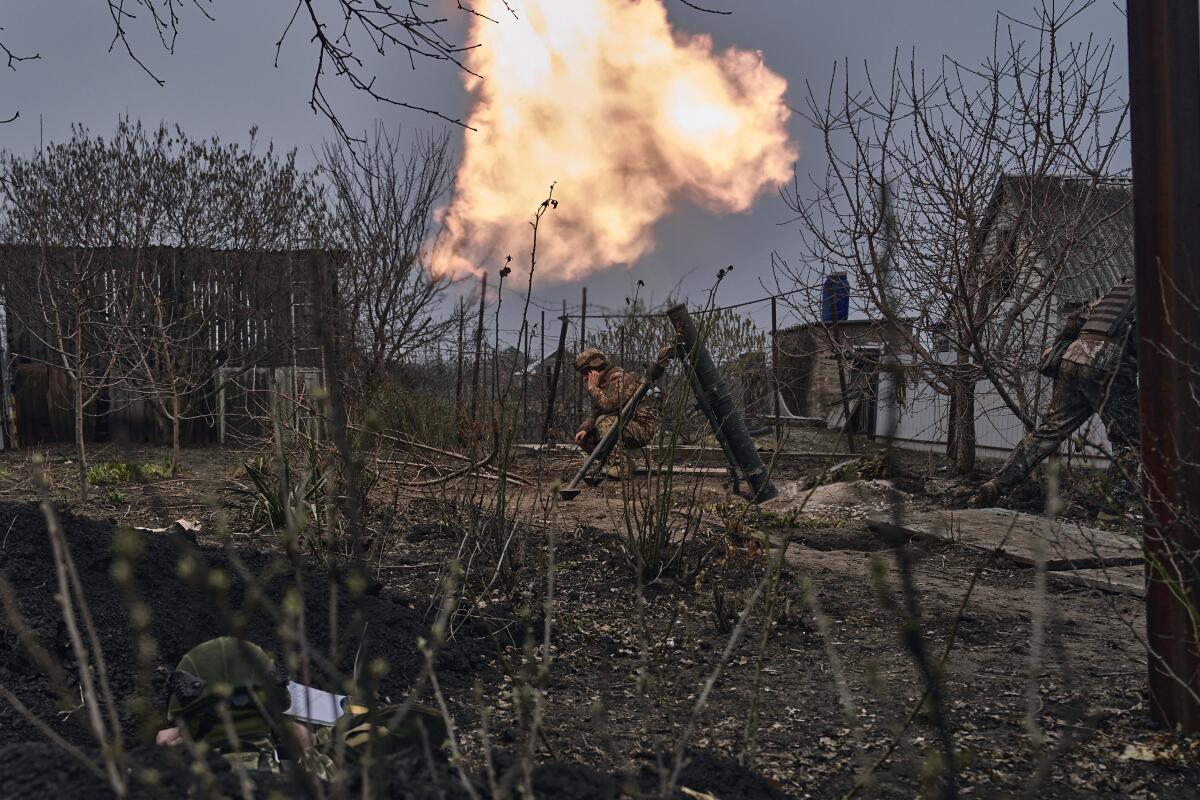Ukraine’s spring offensive already faces high stakes. The Discord leaks make them higher

- Share via
WASHINGTON — The bizarre torrent of intelligence documents posted on a gamers’ chat server, allegedly by a 21-year-old National Guard technician, produced headlines last week about a host of revelations including secret Russian military plans and U.S. espionage against allies like Israel and South Korea.
But some of the revelations weren’t exactly new. U.S. allies learned long ago that our intelligence agencies spy on them, and most reacted to the news with a shrug.
But the damage to American foreign policy, especially the Biden administration’s effort to organize international support for Ukraine, is real.
“This is embarrassing for anyone who’s ever had a security clearance,” a former senior official told me. “The allies are going to look at this and conclude that they can’t trust us with any of their secrets.”
The so-called Discord leaks, named for the social media site where the documents appeared, were a windfall for Russia’s counterintelligence agencies, too.
“The Russians can use those documents to make intelligence gathering more difficult for us,” said Paul R. Pillar, a 28-year veteran of the CIA. “They can use them to narrow down the possibilities of where they’ve been compromised.”
Wisconsin’s Supreme Court election was the latest example of abortion politics hurting Republicans. But even as voters in swing states send a clear message, red-state officials continue to push abortion bans, with Florida likely to adopt one this month.
The documents included detailed assessments of Ukrainian army units, their deployment and the state of their weaponry.
U.S. officials have said most of the documents seem to be genuine, although at least one, a summary of Ukrainian and Russian casualties, has also turned up in a version that appears to have been doctored.
An FBI affidavit unsealed in U.S. District Court in Boston on Friday confirmed that at least one of the documents was genuine and was classified at the top secret level.
But intelligence experts said those disclosures may be less damaging than they look.
“The battlefield intelligence has a limited shelf life,” said Douglas Lute, a retired Army lieutenant general and former commander of U.S. forces in Kosovo. “It changes almost day to day.”
“The part that’s most damaging is the information about which units are getting the most advanced armor,” including Western tanks, Lute said. “The Russians can conclude that those are the units they should focus on.”
But the Ukrainians can make things harder by changing unit names and assignments, he noted.
A bigger problem, Lute suggested, may be the leaks’ effect on any countries willing to send aid to Ukraine, but only if they can keep their role secret. After the leaks, those governments are more likely to be risk averse.
One of the documents, for example, listed Serbia alongside the countries that have agreed to supply weapons to Ukraine — a surprise, since Serbia has officially stayed neutral on the war and has tried to maintain friendly relations with Russia.
Serbia’s defense minister quickly denied that his government has supplied weapons to Ukraine, but added that he couldn’t prevent private arms deals.
The biggest impact of the Discord leaks, though, could stem less from their substance than from the striking pessimism they revealed in U.S. intelligence assessments of Ukraine’s planned spring offensive.
A U.S. intelligence assessment reported by the Washington Post warned that Ukraine suffers from “deficiencies in training and munitions” and said the offensive was likely to achieve only “modest territorial gains,” a result “well short” of Kyiv’s goals.
Officials have not contested the authenticity of the document.
Another report warned that the war could descend into a long stalemate in 2024.
Some U.S. officials have been privately voicing similar assessments for months, warning that Ukraine’s official goals for its counteroffensive may be unrealistic. The Ukrainians themselves have clamored publicly about shortages in air defense and artillery.
But those judgments somehow appeared starker on paper, in the spare language of official intelligence reports.
Just when President Biden and his aides were trying to persuade other countries to step up their aid to Ukraine, the Discord documents put an unexpected spotlight on private U.S. doubts that Ukraine can win.
“It’s not as if nobody realized the Ukrainians face a hell of a challenge,” Pillar said. “But the fact that it’s being said in official channels may make it more difficult to sustain the coalition” supporting the Kyiv government.
Lute agreed.
“This leak accelerates the erosion of Western support for Ukraine,” he said.
Polls in the United States and Europe have found that public willingness to send aid to Ukraine is slowly declining. An Associated Press poll in February found that 48% of Americans supported U.S. weapons aid to Ukraine, down from 60% last May.
Governments facing public skepticism will be even less likely to continue contributing money and weapons to Kyiv if the war begins to look like a lost cause.
Ukraine’s spring offensive was never a sure thing. The Discord leaks, however unlikely their origin, have made the stakes even higher.
More to Read
Get the L.A. Times Politics newsletter
Deeply reported insights into legislation, politics and policy from Sacramento, Washington and beyond. In your inbox three times per week.
You may occasionally receive promotional content from the Los Angeles Times.












